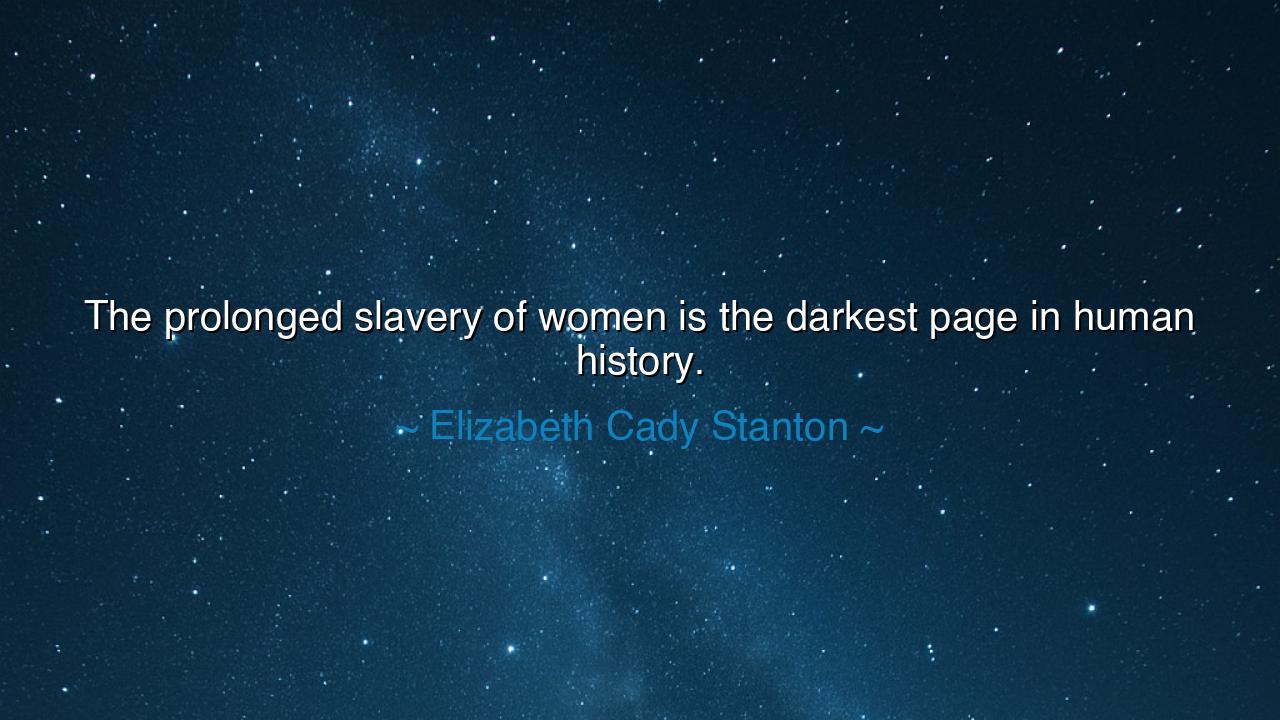
The prolonged slavery of women is the darkest page in human






“The prolonged slavery of women is the darkest page in human history.” – Elizabeth Cady Stanton
Listen well, O children of justice and inheritors of freedom, to the words of Elizabeth Cady Stanton, the prophetess of equality, who raised her voice when the world was still cloaked in silence. In her declaration—“The prolonged slavery of women is the darkest page in human history”—she does not speak in metaphor, but in mourning. For she saw that through the long centuries of civilization, amid wars and empires, invention and discovery, one truth remained unchanged: half of humanity had been bound by chains invisible but unbreakable, denied the right to speak, to choose, to live as equals beneath the sun.
Stanton was born in the 19th century, in a time when women were regarded as dependents of men—without vote, without property, without voice in the laws that governed them. Yet she saw further than her age. She knew that the subjugation of women was not a passing injustice, but a foundational wrong upon which countless others rested. She called it the darkest page not because it was the only evil in history, but because it was the oldest, the most pervasive, and the most silently endured. From the dawn of recorded time, in palaces and huts alike, woman was made servant to man, her spirit dimmed by the laws of patriarchy, her gifts buried beneath centuries of obedience.
Her words call us to remember that history itself is not merely the record of kings and wars—it is the record of suffering and silence. In ancient Greece, where philosophy was born, women were confined to the home. In the Roman Empire, they were possessions of their husbands. In medieval Europe, they were bound to the Church’s decrees of submission. Even in the age of Enlightenment, when men spoke of liberty and reason, they denied those very ideals to their mothers and daughters. So it was that civilization advanced in science, art, and conquest, yet remained primitive in justice, blind to the humanity of those who gave it birth.
Consider, O listener, the life of Sojourner Truth, born into slavery in 18th-century America—a woman doubly bound by race and gender. She fled her chains and stood before great men, declaring, “Ain’t I a woman?” In those four words she struck the same chord that Stanton did years later—the cry for recognition, the demand that women be seen not as property or ornament, but as souls equal in strength and worth. Truth’s courage and Stanton’s intellect came from the same sacred source: the conviction that no civilization built on subjugation can truly call itself free.
Stanton herself was a pillar of the women’s rights movement, the architect of the Seneca Falls Convention in 1848, where she and her sisters declared that “all men and women are created equal.” She fought for the vote, for education, for the right of women to stand in the pulpit and the parliament alike. Yet even in her time, she saw that the world’s conscience was slow to awaken. She called woman’s enslavement “prolonged,” for it endured across ages, carried forward by customs, laws, and faiths that sanctified inequality. Her lament was not only for the suffering of women, but for the moral blindness of humanity, which for thousands of years accepted this injustice as natural.
The power of her words endures because they reveal not just oppression, but betrayal—the betrayal of civilization’s own ideals. How can humankind boast of progress when it denies equality to those who nurture it? How can liberty ring true when half the world is silenced? Stanton’s quote reminds us that the measure of history’s light is seen in how it treats its women. Every age that forgets this truth repeats the darkness of its predecessors, and every nation that uplifts its women moves closer to the dawn of justice.
So let this be the lesson carried forward through time: freedom is incomplete when it is not shared by all. The liberation of women is not a single struggle, but the continuation of humanity’s oldest revolution—the fight to make love and reason the rulers of the earth. Let no one say the struggle is finished until every daughter stands equal beside every son, in law, in labor, and in voice.
And thus, as Elizabeth Cady Stanton teaches, history’s darkest page can yet be rewritten—but only if we dare to hold the pen. The chains of ages are heavy, but they are not unbreakable. Let each generation take up this work anew: to honor those who fought before, to challenge the injustice that remains, and to ensure that no page of the future will ever again be stained with the enslavement of half the human race. For in the freedom of women lies the redemption of all humankind.






AAdministratorAdministrator
Welcome, honored guests. Please leave a comment, we will respond soon